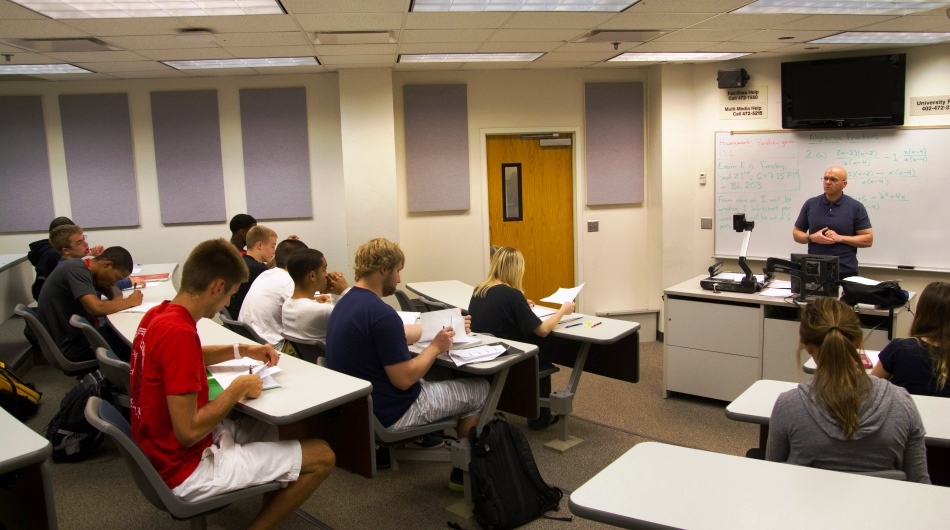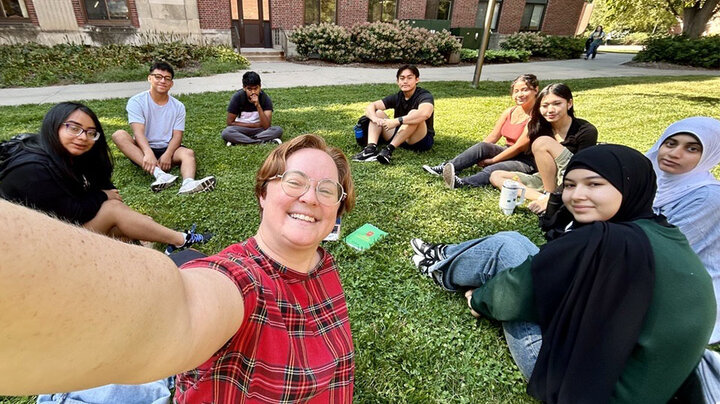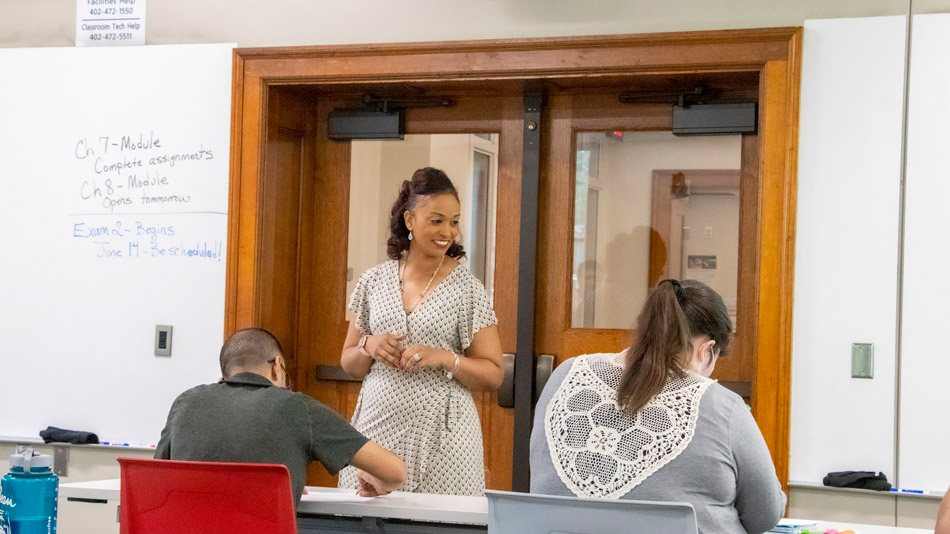MATH 104 (Applied Calculus)
MATH 104 (3 credits) covers the rudiments of differential and integral calculus with applications to problems from business, economics, and social sciences.
The SSS section meets five days per week instead of the standard three days, enabling students to receive extra classroom instruction.
MATH 107 (Calculus II)
Prerequisition is MATH 106 or Calculus I in high school and qualifying for MATH 106 on the MPE.
MATH 107 (5 credits) includes: more complex calculus including integration theory; techniques of integration; applications of definitive integrals; series, Taylor series, vectors, cross and dot products, lines and planes and space curves.
This course meets two hours per week and its associated recitations meet three hours each week.
Fall Semester
MATH 101 (College Algebra)
Prerequisite: Appropriate score on the Math Placement Exam; or a grade of P, C, or better in MATH 100A.
MATH 101 (3 credits) includes: real numbers, exponents, factoring, linear and quadratic equations, absolute value, inequalities, functions, graphing, polynomial and rational functions, exponential and logarithmic functions, and systems of equations.
The SSS section is taught 3 days per week in conjunction with the W.H. Thompson Learning Community.
MATH 106 (Calculus I)
Prerequisite of an appropriate score on the Math Placement Exam; or grade of P, C, or better in Math 102 or MATH 103.
MATH 106 (5 credits) includes: functions of one variable, limits, differentiation, exponential, trigonometric and inverse trigonometric functions, maximum-minimum, and basic integration theory (Riemann sums) with some applications.
The SSS section is taught 5 days per week in conjunction with the W.H. Thompson Learning Community. This course meets the requirements for ACE Student Learning Outcome 3.
MATH 103 (College Algebra and Trigonometry)
Prerequisite of an appropriate score on the Math Placement Exam; or grade of P, C, or better in Math 100A.
MATH 103 (5 credits) includes: first- and second-degree equations and inequalities, absolute value, functions, polynomial and rational functions, exponential and logarithmic functions, trigonometric functions and identities, laws of sines and cosines, applications, polar coordinates, systems of equations, graphing, conic sections.
The SSS section is taught 5 days per week in conjunction with the W.H. Thompson Learning Community.
MATH 203 (Contemporary Mathematics)
MATH 203 (3 credits) includes: Applications of quantitative reasoning and methods to problems and decision making in the areas of management, statistics, and social choice. Includes networks, critical paths, linear programming, sampling, central tendency, inference, voting methods, power index, game theory, and fair division problems.
The SSS section is taught 3 days per week in conjunction with the W.H. Thompson Learning Community. This course meets the requirements for ACE Student Learning Outcome 3.
ENGL 151-T26: Writing for Change
In this class, which is usually capped at 10 students, you will be guided through developing strategies for writing and research, examining and analyzing arguments, providing constructive feedback on peer writing, and sharing and cultivating your own unique scholarly voice. This course is meant to be an introduction to college-level writing and how writing can support you in your personal and professional goals.
The theme of this class is ‘know what you believe and why’. Through your writing in this class, you will learn more about yourself, your beliefs, and how to act on them in the world. You will also learn about the beliefs of others and how to communicate with those who have beliefs that are different from your own. Course projects will range from examining the beliefs you hold, researching those beliefs, and learning how to advocate for your beliefs via writing genres like the letter to the editor or elected official. This class will help prepare you for all sorts of situations in the future where you will need to communicate your beliefs, values, and research with a diverse audience.
ENGL 254-T26: Writing & Communities
In this course, which is traditionally capped at 10 students, you will engage in a variety of writing projects meant to help you connect to yourself, your major, your future career field, and the communities around you, including our class community. Projects will range from writing about the communities that have shaped you and your values, utilizing college-level research skills to profile a community and its members, writing a collaborative paper with your peers on how writing skills will support your work in your major and future career, and advocating for a community issue about which you are passionate.
Please note that this is a 200-level, writing-intensive course and that engaging with your peers, via peer review and collaborative projects, is a requirement of this course.
BIOS 101 (General Biology)
Biology 101 is designed to facilitate learning of biological processes and properties of living organisms. As an introductory course, it is taught by building the basic understanding of biology by covering the scientific method, basic chemistry, biochemistry, cell structure and function, membranes, enzymes, metabolism, photosynthesis, cellular reproduction, genetics, DNA, expression of genes, biotechnology, evolution, speciation, population ecology, communities within ecosystems, and conservation biology.
This course meets the requirements for ACE Student Learning Outcome 4.
Additional Objectives: By the use of scientific methods, and with the knowledge of the natural and physical, address problems through inquiry, interpretation, analysis, and making inferences from data. This thereby allows the student to determine whether conclusions or solutions are reasonable.
LIFE 120 (Fundamentals of Biology I)
First in a series of life sciences courses. A systems approach to the study of life at the cellular level, investigating cellular structures, chemical processes, cell metabolism, cell division, gene expression and introducing patterns of inheritance. Parallel registration in LIFE 120L is required.
This course meets the requirements for ACE Student Learning Outcome 4.


